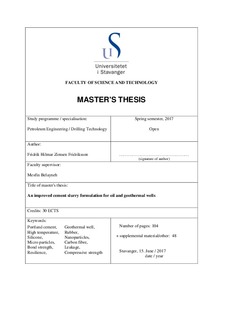| dc.description.abstract | Properly designed cement slurry and good cement job are crucial factors for integrity during a well‘s life cycle. For this, cement must be able to prevent migration of formation fluids, support the well construction and withstand high pressure and temperature. A survey on the Norwegian continental shelf showed that 11% of well integrity issues were due to cement related problems [1]. Another integrity survey in Pennsylvania showed that 2.41% of over 3,500 wells had casing or cementing related failures in 2011 and 2012 [2]. It has been reported that the primary reasons for gas leakage in a well are casing and cementing integrity issues [3]. This shows that the conventional cement has problems and to prevent future integrity problems the cement technology must be improved.
Drilling a geothermal well is in many way similar to drilling a hydrocarbon well. The main differences are the high temperature, generally from 160°C to above 300°C, the presence of highly corrosive gasses and often highly fractured formation [4]. This harsh environment demands even more need for cement with improved properties to withstand the geothermal environment.
In this thesis, new cement slurry additives have been studied and tested. G class Portland cement was mixed with various additives and exposed to temperature cycling to study its ability to withstand high temperature. Then the cement was tested for leakage, bond strength, compressive strength and resilience. The experiments showed the following results:
• The addition of acid treated silicone rubber to cement increased its compressive strength, resilience and bond strength with steel pipe by 26%, 34% and 1,435%, respectively. Also, it decreased the average leakage after number of temperature cycles by 30%.
• The addition of acid treated silicone debris to cement increased its compressive strength, resilience and bond strength with steel pipe by 63%, 107% and 727%, respectively.
• The addition of acid treated silicone rubber along with other additives to cement increased its compressive strength, resilience and bond strength with steel pipe by 29%, 72% and 1,738%, respectively. Also, it decreased the average leakage after number of temperature cycles by 42%.
This study showed that a new material, acid treated silicone rubber, both as the only additive and in mixture with others, can increased the strength of the cement significantly and showed improved resistance against temperature cycling. | nb_NO |

